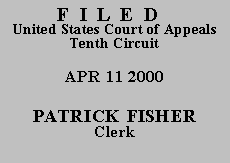

| WAYNE BOLLMAN,
vs.
ARAPAHOE COUNTY DISTRICT
ATTORNEY and UNKNOWN
JUDGE OF THE DISTRICT COURT
OF ARAPAHOE COUNTY |
|
On August 16, 1999, the Arapahoe District Attorney dismissed the DUI charges and the magistrate judge ordered Mr. Bollman to show cause why the § 1983 case should not be dismissed as moot. Mr. Bollman did not argue the merits of the case but requested $209.20 for his costs in typing fees, copying, stationery, stamps and filing fees. The magistrate recommended that the case be dismissed as moot. Mr. Bollman objected to the recommendation on the grounds that he should be awared his costs as a "catalyst." The district court adopted the recommendation noting that a pro-se litigant is not entitled to an award of attorney's fees, see Kay v. Ehrler, 499 U.S. 432, 435 (1991), and granting Defendants costs. Judgment was entered in favor of Defendants.
The district court did not abuse its discretion in denying Mr. Bollman's request under § 1988. To qualify for an award under § 1988, a plaintiff must be a "prevailing party." Where, as here, a party did not receive "at least some relief on the merits of [the] claim" by judicial determination, Texas State Teachers Ass'n v. Garland Indep. Sch. Dist., 489 U.S. 782, 792 (1989), he must meet the two-part catalyst test. "Under this test a plaintiff must have been a 'significant catalyst' causing a defendant to change position, and the defendant's change in position must have been required under the law." City of Chanute v. Williams Natural Gas Co., 31 F.3d 1041, 1048 (10th Cir.1994) (internal quotations and citations omitted). Although Plaintiff asserts the former, he has not established the latter. Thus, the district court did not abuse its discretion in determining that he is not a prevailing party entitled to the items requested under § 1988 or Fed. R. Civ. P. 54(d).
AFFIRMED.
Entered for the Court
Paul J. Kelly, Jr.
Circuit Judge
*. This order and judgment is not binding precedent, except under the doctrines of law of the case, res judicata, and collateral estoppel. This court generally disfavors the citation of orders and judgments; nevertheless, an order and judgment may be cited under the terms and conditions of 10th Cir. R. 36.3.
**. After examining the briefs and the appellate record, this three-judge panel has determined unanimously that oral argument would not be of material assistance in the determination of this appeal. See Fed. R. App. P. 34(a); 10th Cir. R. 34.1 (G). The cause is therefore ordered submitted without oral argument.